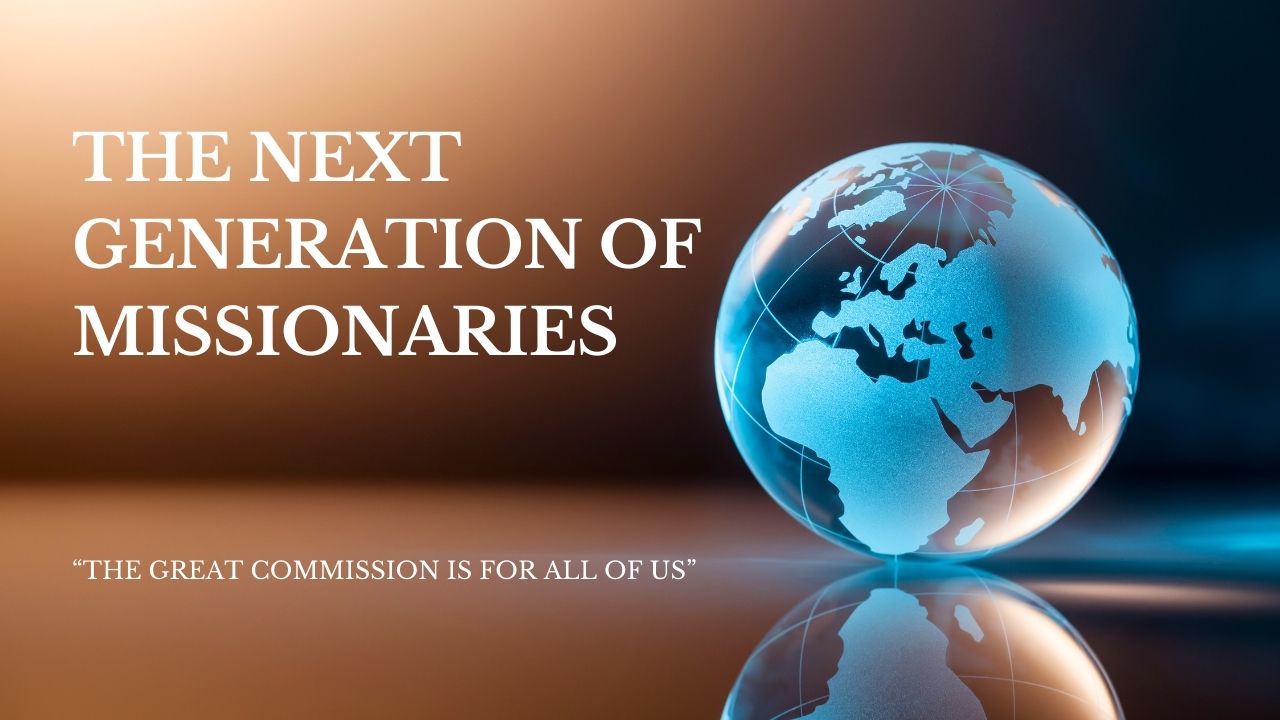The Next Generation of Missionaries

How will they know unless someone tells them? This is the missional call of Romans 10:14. It is our call. Yet today we wrestle with another question: How can they know if no one is legally allowed to tell them?
The modus operandi of the modern missionary, walking into a country and instantly being granted a long-term visa for missionary work, boxes of bibles and tracts in tow – for most of the world, that day is gone. There are over three billion people with no access to the gospel unless someone tells them, and the doors are closing. Fewer and fewer nations want missionaries, and many Christians today don’t even believe anyone should be a missionary.
Yet, no matter the state of the Church or the church of the State, we must all wrestle with the missional call of Romans 10:14. We must all wrestle with Christ’s Great Commission in Matthew 28:19. And we should all ask ourselves, “How is God at work in the midst of it all? What is the missio dei – the mission of God? Is he sending me? How is he sending me?”
The Modern Missions Movement: A Brief History
In 1793, William Carey embarked on a journey to India with his family that gave way to the modern missions movement. Carey’s work inspired many, and not long into the 19th century, groups of missionaries in coastal cities began looking inland to the multitudes of people who had yet to hear the gospel. The 19th century gave rise to hundreds of Bible translations and the number of missionary agencies grew from 7 to 100! Thousands of missionaries were sent as globalization and technological advances rapidly lowered the barriers to resource and send new missionaries. Religious worker and missionary visas allowed for easy and unlimited access to unreached people all over the world. This was the stage on which the modern missionary movement played.
…And that era is nearly gone. Today, more than two thirds of the globe live in countries that do not offer missionary visas anymore. Countries that once allowed unlimited access to religious workers are increasingly closing their doors to what many have accused as being colonization, cultural crusading, or brainwashing.
Navigating the New Landscape
Despite these challenges, the Great Commission remains unchanged. In response, we are seeing a rebirth of long-forgotten missions strategies. Many are becoming missionary-students. Others have taken jobs with global corporations, and still others have jumped into the world of entrepreneurship, starting businesses in a country not their own in the hope that they will once again have the opportunity to share the gospel.
Not all these changes have been pretty. Many missions organizations have questioned whether it is possible to be a full-time business owner and still have time for gospel proclamation, discipleship, and church planting. Missionaries have left the field, burnt out, wondering how they could live both lives simultaneously, wondering if they even had a right to ask for financial support as a missionary when they were once again working a full-time job in the marketplace. Seeing the business as a “necessary-evil,” that is stealing from their kingdom work, some have neglected their businesses in less than ethical ways. There have been accusations of “job-faking,” or starting shell companies that launder missions money through an otherwise dormant business. Countless stories have been told of Christian expats being deported from nations accusing them of doing missionary work on a visa that does not allow for it.
But in the midst of it all, God is at work. He is sending. He is opening doors to creatively reach the lost. Many missions organizations have adopted Business as Mission (BAM) arms to educate and equip missionaries to reskill and redevelop themselves as Christian business people. Funding groups have launched BAM “shark-tanks” to encourage sustainable ideas. Christian coaching and consulting companies have sprung up to support this difficult approach to gospel access. They have worked to train missionaries in a holistic approach to business and mission, a missiology that sees the opportunity for ministry in partnership with business and not as one warring against the other.
Engaging the Whole Church in Missions
Still, however, some have suggested that this retrofitting of the old missionary model may not be the best way forward. Surely BAM has allowed us to share the gospel in closed countries in new and effective ways. That is not the question. But as we are reminded that it is God’s desire to engage all of our giftings in missions, marketplace efficacy in addition to ministry prowess, the question quickly arises, “Who is God calling, and how are we equipping them?”
The Great Commission call is for all of us! So what if we, marketplace believers, saw our businesses and workplaces as extensions of the calling of God on our lives, where the sacred/secular divide no longer existed? What if we saw every relationship as an opportunity to love our neighbor as ourselves and to proclaim the gospel?
In this imaginary world, marketplace people would be so holistic in their “secular” spaces that being a Christian business owner is an obvious calling from God. Being a Christian and a business owner means that you often have opportunities to pray with your employees. A few of your clients and co-workers might come to your house and study scripture with you at your encouragement. You might start off a strategy session asking your team how your business can more closely align itself with scripture to bring health and healing to the world around you. You might lead someone to Jesus in a one-on-one business meeting. In today’s terms, some might call this person a missionary, or they might say it is marketplace ministry, or business as mission. But it isn’t! Missions is cross-cultural gospel proclamation, and marketplace ministry is just another way of saying “Hey, look! Those Christians are actually being Christ-like in the marketplace.”
Imagine how this would play out on a global missions scale. Missions sending organizations would begin actively recruiting in Christian business schools and campus programs like Chi Alpha. Instead of only facilitating support models, they might facilitate in job placement, investment, and international franchise support. They would offer visa and travel services, insurance, language, and educational support either on a small fee structure or through charitable support.
In this world, it would not be unusual to see a believer in your church announce one day that she felt called to take her business and expand into Egypt with a strategic, missional focus. You should expect to have a brother come to you with the news that he has taken a job in exporting in Hong Kong and is excited to deliberately live out his faith there. You might learn of a student who intentionally decides to study in Saudi so that he can learn a trade and share the gospel with some people who have never heard. You might hear of tech entrepreneur who knows she can work from anywhere with a good internet connection, so she chooses to buy a condo in Bangkok and hosts regular dinner parties with neighbors where they talk about faith. In the words of the Lausanne Committee, we need “the whole church taking the whole gospel to the whole world.”
Redefining Missionary Work
Larry Sharp, author of “Missions Disrupted” and founder of IBEC Ventures, writes about this new landscape in a white paper precursor to the book,
“I just returned from an Asian country where our BAM consultants helped an architect from California buy a boat-building company with all Muslim and Hindu workers. He is operating it with kingdom values and as a way to build relationships with all thirty employees and the community. We interviewed the employees, and several referred to the camping trips the boss sponsored in which they spent the night on the beach talking about God and spiritual things.
You can call it missionary work or marketplace evangelism—or you can just call it what Jesus told us to do.”
Sharp wonders if the next generations of missionaries might abandon the “missionary” term all together and approach the call differently. Will the next generation of missionaries need to wrestle with a special, covert “missionary” terminology, or will they simply be Christian business people proclaiming Christ in a strategic, cross-cultural context? Instead of sending only a few personnel with pastoral backgrounds to further the gospel, perhaps God is sending all of us, marketplace and ministry people together?
Sharp is not the only one challenging us to redefine our approach. Mats Tunehag, BAM Global Chairman, describes a similar vision on the “BAM Stories” podcast. He imagines a future where we no longer use the term “Business as Mission” or “BAM” because the distinction is no longer necessary.
“What we have been doing in the last 20 or so years is creating a common language around business as missions…We have needed, for a season, a term to help bring us together. BAM is like a scaffolding that you’ve needed as you build a new paradigm. Once your paradigm is built, you take down the scaffolding.”
We can leave the terminology behind. As followers of Christ, we know that Jesus has commanded us to love others and share His love with them. There is no special class or more sacred work in the kingdom of God.
A Unified Mission
In this changing landscape for missions, we must unravel the sacred secular bifurcation that enlists some in laity and others in priesthood. We are all called to make disciples. This is the occupation of all believers according to the Great Commission. It does not dictate that a believer burdened with the lost in Kolkata must leave the workforce and put on the clerical collar. I pray that no one would take it to mean that the disciplemaker living on a full-time church salary should take a second job in some righteous justification. But may we be willing to “become all things to all people so that by all possible means [we] might save some” (I Cor. 9:22).
David Platt, pastor of McLean Bible Church and author of the book “Radical,” says that our default position should always be to take the gospel to those who do not have it. If not, we better “have a really good reason for staying and a radical commitment to sacrificing [our lives] here to send more people moving there.”
If God has gifted you with marketplace skills, how might He be equipping you to partner with His mission? Perhaps you can invest in missional business or donate to missional non-profits. Maybe you can take a marketplace job or start a business among unreached people, or use your time and talents to coach those who are.
If God has gifted you with ministry skills, how is He using you to equip others? How is He using you to make disciples who make disciples? Be sure that you are leading in a way that others are not dependent on you but growing into mature leaders in their own spheres of influence. If all work can be sacred when it is redeemed by God, and God can call us from the marketplace jobs to church staff positions, then surely the reverse can be true as well. Could God be calling you to take your ministry skills to the marketplace? We know He has and He does.
Taking the Next Steps
Here are a few practical steps you can take in response today:
First and foremost, we must dismantle the sacred/secular dichotomy in our lives if we intend to be led by Christ. Ask God to give you His perspective on the sacredness of work and how He has chosen to redeem all things.
Secondly, we should ask God how he has gifted us and how he is leading us. There are no second-class citizens in the kingdom of God who sit back and watch the elites do the ministry work. Who has God placed in your sphere of influence and how has He equipped you to serve His mission in the world?
And finally, we should ask God to help us in our weakness. If we lack ministry skills, may He equip us. If we lack marketplace influence, may He open the doors. May we be made into Christ’s likeness and embody that missio dei, to empower “the whole church [to bring] the whole gospel to the whole world.”



